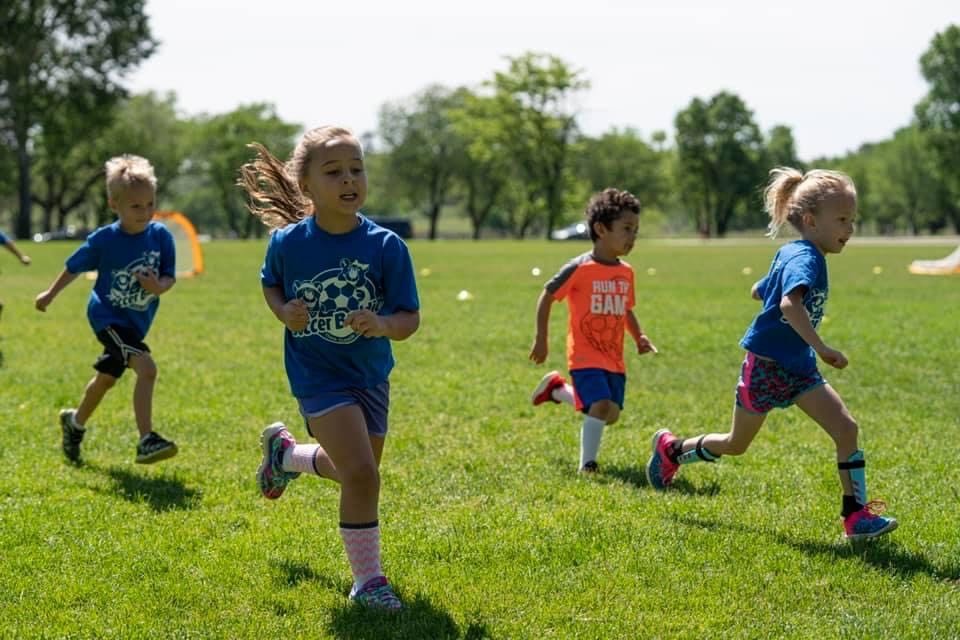Why Soccer has Amazing Health Benefits for Your Child
We all want to have healthy, active kids but I bet you don’t know just how amazing soccer is for kids (and adults!) of all ages.
Soccer, like other sports, teach you ball skills, how to play as a team, and provide benefits in every aspect of a child’s life from physical health to mental, emotional, and social wellbeing.
Why Soccer?
All sports are fantastic for a child’s development, but we love that soccer is so accessible to many kids.
● All you need is a ball and some space. It can easily be played indoors or outdoors, just grab a ball and a friend and you can practice.
● All sports are for boys and girls, but we do love that there are incredible male and female players all over the world your child can look up to.
● Soccer is financially accessible. There’s not a lot of extra gear and cost involved in soccer. We do need to charge a fee, but soccer is reasonably priced compared to other sports that cost more and have more equipment.
● Soccer is physically accessible. Most children can pick up the basics of kicking and passing to enjoy a soccer game. If your child has physical challenges, this doesn’t stop them from playing! There are loads of ways to adapt the game and our lessons to accommodate differing abilities.
Let’s Talk Health Benefits
Here’s a rundown to some of the benefits your kids will receive just by playing soccer with us each week!
Soccer supports physical development
As soccer is a ball sport, kids are not only getting the cardio benefit of running around, but they are also constantly improving their balance, coordination, and muscle strength while kicking the ball.
Encouraging a habit of physical movement will have long term benefits throughout your child’s life. Physical activity is proven to be the biggest factor in reducing childhood obesity. It has twice the benefit than a ban on fast-food advertising aimed at children.
This carries on into adulthood. Adults who are physically active have a reduced risk of heart disease, strokes, cancer and diabetes.
Their brains are growing, too!
Soccer isn’t just a physical sport.
When a child is learning a new skill, their brains are working overtime. Learning new abilities helps to fire neural pathways which develop brain capacity, strategic thinking, creativity, openness to learning and more.
Learning the rules of sport and playing as a team means your child is constantly having to listen, comprehend, and act accordingly. This leads to improved complex thinking and executive function (self-control and organizing your thoughts), memory, faster reaction times and better spatial awareness.
Your vestibular system (that controls balance and spatial awareness) is directly linked to reading and other academic skills. When a child is running, jumping and balancing in sports, they are developing brain functions that have a positive knock-on effect on learning and schoolwork.
Involvement in sports is a predictor of future career success as well. Oppenheimer Funds found that kids involved in sports display better confidence, teamwork and leadership. A survey of 400 female corporate executives found that 94% played sport and 61% say sports contributed to their career success.
Endorphins are a major mood booster
A 2014 study found that the single strongest predictor of positive wellbeing in later life was whether someone played sports in high school. Read that again. Isn’t that incredible! It’s not the amount of money you have or the school you go to but getting involved in sports.
The Aspen Institute Project Play research shows that active kids have higher self-esteem and lower levels of depression, not only as children but as adults as well.
And it doesn’t take a lot of movement to receive the mental health benefits, even an hour a day does wonders!
The Aspen Institute reported, “A 2019 study found that children who reported no exercise were twice as likely to have mental health problems, particularly related to anxiety and depression, compared with those who met the recommendation of an hour a day, and a 2020 study suggested that the more physical activity teenagers participated in, the less likely they were to report depression as 18-year-olds (The New York Times, 2020).”
Learning to play together teaches social skills
Soccer is a team sport meaning that it has the added benefits of social engagement and interactions. Team sports give children a sense of belonging. It helps them make new friends and builds their social circle outside of school.
The Australian Health Department reports that “Playing in a team helps children to develop many of the social skills they will need for life. It teaches them to cooperate, to be less selfish, and to listen to other children… and to take directions from coaches, referees, and other adults.”
Kids that do sport, do well.
Being physically active helps kids achieve in all areas of life. Studies show that kids who engage in regular physical activity:
▪ Perform up to 40% better in test scores
▪ Are 15% more likely to go to college
▪ Have higher self-esteem and lower levels of depression
▪ Have reduced risk of heart disease, strokes, cancer and diabetes
▪ Are more likely to be active as adults
Come and play with us!
Let’s get physical and reap the benefits! We would love to welcome your family to one of our six Colorado locations. Ready to try a class for FREE? Register today!
Become a Soccer Buddies Super Fan!
Like us on Facebook
Delve into Soccer Buddies cuteness on our Instagram
Learn more about our program here
Ready to try a class for FREE? Register today!
#soccer #soccerbuddies #playmatters #colorado #local #supportsmallbusiness




